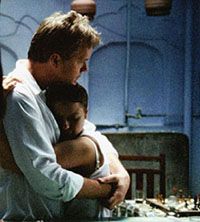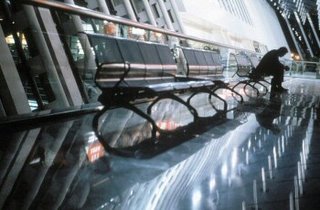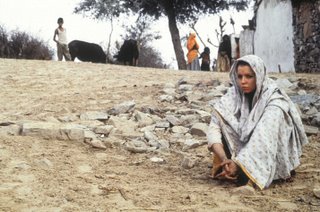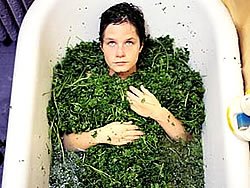The Aesthetics of Sorrow in Film - two case studies
Most people I've spoken with about Ang Lee's Brokeback Mountain have described it in terms that I would paraphrase as a beatifully sad film. I have yet to see the film, but having seen Ang Lee's Crouching Tiger Hidden Dragon, I take what they say at face value. When the majority of hollywood tripe films (i.e. romantic comedy - "Failure to Launch") or even very good heartwarming films (i.e. Napoleon Dynamite - with its truly happy ending) concern themselves with emotional and aesthetic gratification (Sara Jessica Parker and Mathew McConaghey[sp?] are both beautiful people - by hollywood standards - and the sets 'ocean front property with nice light coloring and warm coloring' give a feeling of warmth, and joviality) something must be said for the importance of films that don't pander to this desire from the paying public. The beauty of sorrow in film has a far different pull on the viewer. I'm disregarding films like Sean Penn's "The Assasination of President Nixon" which are about as comfortable to see and hear as all ten fingernails dragging themselves across the chalkboard and leave you somewhat ill to the stomach and mind afterwards. The good sad films leave you with the opposite of gratification, there is an emotional emptiness that seems to fill the stomach when the curtain closes and yet you are convinced that what you've seen was nothing less than truly beautiful.

Take English director Michael Winterbottom's futuristic tragedy "Code 46" with Samantha Morton and Tim Robbins. Winterbottom manages to create a futuristic world solely out of the components and concerns of our own modern one. Instead of relying on expensive sets, filming was taken to various different parts of the world (Dubai, Shanghai, Northern India, amongst others). Most of the world has been reduced to desert ('a fuera') where the poor and displaced eek out a living, while the fortunate live in the cities. The story tells of an insurance investigator who falls in love with the woman he is sent to investigate. The woman, Maria, feels that she has been waiting for Robbins all her life and that fate has intervened to bring the two of them together. There is a palpable attraction between the two in the first seconds of their meeting (an interogation room - where Robbins uses an 'intuition virus' to determine that Maria is the one who has been dealing out false insurance papelles). They meet later on a subway and over the course of the night begin a passionate affair (Robbins is married with a child).

The colors normally associated with warmth and happiness in films are inverted as the bright and hot colors of the desert wastelands of the outcasts where Maria had lived for a number of years. Other uses of warm colors and lighting paint the picture of a grand and solemn sense of urban alienation for those living inside the cities through Winterbottom's superb camera work. For two souls to meet through chance and share each others' embraces and find love in this aesthetic quickly brings a forlorn beauty and the chance of true happiness. In time, Robbins does some investigating of his ownand finds out that a relationship with Maria is a violation of Code 46. Because of mass cloning and in vetro births, much of the world shares genes. The code is in place to protect against sex between individuals who might share similar genes resulting in incestuous reproduction. Even though the two characters are worlds apart both in where they came from, how they were brought up, and who they really are the world they live in or perhaps fate has conspired to make their love forbidden. A pondering Robbins seen above in the airport with hundreds of flourescent Damoclesian swords aiming at him from above and below. It is a beautiful shot, but it offers little comfort. Enter the desert and become a nobody, remain in the stark cities and lose the one true love of his life. He comes back the Shanghai, ordered by his bosses to track down the offender when he failed the first time, and learns that Maria has had a pregnancy terminated and all memories of him and their affair "the sex act" as it is termed by a doctor, wiped from her memory. At this point, the warmth and inkling of happiness we have from the film is solely an effect of the two lovers being together. They are playing a dangerous game and the stark beauty of the opposing environments seems ready to swallow them at any point.
In an embrace at the airport, when Maria has helped Robbins gain passage out of Shanghai, she remembers him from her fatalistic dreams. An embrace is all that is needed, they resolve to throw caution and the demands of their world to the wind and flee to the legendary freeport of Jbel Ali. Once they arrive in the city (a combination of Rajastan and Dubai) the aesthetic changes. Yes, the pleasantries of the city are not present, it is dirty and run down but it has personality and warmth. From the blanket to their bed that the hotel owner's wife made, to the children running and playing in the streets. There is a very real sense that where they are now is far more human than the world they were brought into. Perhaps this is an affect of their feelings: they are together and in love, perhaps there is a chance of a life together. After a night of passion, Robbins watches silently as Maria unwittingly betrays their love to the authorities, in voice-over we hear her speak "you must have known what the virus would make me do, was there nothing you could do to stop me?". She calls in a Code 46 violation and returns to bed with no memory of what she has done. They flee, they are pursued.
The separate environments and world of the two lovers triumphs in the end. We see Robbins back in the sterile white and blue Seattle, his memory wiped of Maria, Jbel Ali, and everything he knew as vital for his soul for that brief time. Maria is cast a fuera, into the wastelands for her crime. She is unimportant now, one of the outcasts. Thus, she is left with her memories. She and her memories compose all that remains of what once was a beautiful thing. She wanders through the barren desert, a picture of perfect loneliness. She sits, tired, her eyes half-closing before uttering to the emptiness of her world in vain "I miss you."

Andrea Dorfman's first feature film "Parlsely Days" is of a similar vein, if more quirky in its development. This east coast indie venture tells the story that so many films never consider: the end of a long-term loving relationship. Kate (Megan Dunlop) and Ollie have what their friends term the perfect relaitonship. She teaches bicycle maintenance and repair and he's a (absurdly meticulous sex-ed teacher at a local school). The film works well to capture the indie feel of north Halifax, as some critics have put it, from the handlebars of a bike. Kate learns that she is pregnant, and on the advice of her herbalist friend, embarks on a diet of parsley to induce menstruation (a herbal abortion).
She's been with Ollie for five years, he is (sometimes irritatingly so) the picture of a perfect, lving, caring boyfriend (he's referred to as a "male lesbian" by her lesbian friends). Kate, however, shared a passionate kiss with one of her bike students that left her convinced that she could no longer be in love with Ollie. As the film progresses, she is isolated from friends and Ollie (in her own mind) as she mulls over her difficulties. She's tormented as to what to do. In between, we have idyllic flashbacks of how their love began in a canoe on vacation at a lake. It is clear, from these times that the two were very much in love for some time and that the decisions she has to make will be difficult and are hers to make alone.
She see-saws (quite literally in one shot) on her decision to break up with Ollie. Ollie learns of the pregnancy on his own, is elated and has visions of a shared future for him and Kate. Ollie never fell out of love with Kate, he remains faithfully devoted through the last scenes. Kate comes clean with Ollie and, as they sit alone in their canoe that lies in the grass of their backyard, she learns that it was Ollie who was really responsible for the pregnancy (everyone had always thought he was the 'King of contraception'). He tells her he doesn't care about the kiss she shared with the student and that they should move on and stay together. When the words come out, it is with no pleasure that Kate declares "I don't love you anymore". The words bring as much sorrow to her as they do to him. They lie in the canoe all night and following day, in the words of Kate "when you think you're holding someone for the last time you don't want to let go" while a melancholic Julie Doiron cover of "In the Early Morning Rain" plays.
The parsley fails, Kate goes for an abortion. Ollie, has a book constructed for Kate "Other things to think about when you are getting and abortion" that is juxtaposed with a beautiful 8mm sequnce of shots. As the film ends, we see Kate and Ollie when it all began, out on the lake in the canoe. Kate makes him promise that ten years from now, no matter who they're with, they have to come back to this exact place. Ollie promises. The canoe and the lovers fade away and we are left with nothing but an empty lake filling the screen. There are points of intensity in a relationship when vows such as that are made and believed for a long time - as Parsely Days beutifully points out even that can fade away into nothingness.



0 Comments:
Post a Comment
<< Home